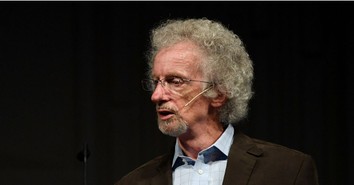Three Big Things I Believe... and One Greater

Sooner or later, one ought to be able to narrow down his major theological (i.e., true life) beliefs to just a few. The only way to do this, it appears to me, is to have lived long enough on this sod as to know oneself thoroughly, to have studied enough of the Word to know the Scriptures intimately, and to have interacted with others over decades as to know the alternatives sufficiently.
Here then are my big three, three non-negotiables I believe with everything in me. The discussion is closed on these, my conviction is rock solid.
1. WITHOUT GOD, THERE IS NO MEANING.
As a young adult, I struggled with the concept of deity and tried to satisfy my youthful-but-inquiring mind that God is no figment of my imagination, but a genuine Person in back of the universe and the One whom we read about in the Scriptures. The more I read and contemplated atheism, the clearer I saw how all it had to offer was despair and meaninglessness.
Back from that brink -- and glad to be -- I had to admit that everything inside me resonated with the message of God in Scripture, both Old and New Testaments. It was more than comforting, because much of it is disturbing. It was rock solid, like I was dealing with reality. The teachings of Scripture fit the real world I was living in.
Ravi Zacharias has written, "If life is random, then the inescapable consequence, first and foremost, is that there can be no ultimate meaning and purpose to existence." That fact, he says in "The End of Reason," is the "Achilles' heel of atheistic belief." In spite of the fact that modern writers like Richard Dawkins, Christopher Hitchens, and Sam Harris like to promote moral values outside of a belief in God, it does not work. If there is no God, there is no ultimate meaning, and the child molester, the serial killer, Dr. Albert Schweitzer and Dr. Billy Graham or Mother Teresa, all come to a common end of nothingness.
Everyone seeks meaning and purpose. Movie script-writer Leonard Mlodinow (Newsweek, May 4, 2009) tells how he found himself at a Hollywood party chatting with a successful model when an attorney came up and usurped her attention. It turned out they were both Trekkies, devotees of the Star Trek saga, and knowledgeable about the most minute of details. He writes, "I stood there with a blank look, obviously over my head. Too much detail for my taste.... I was in awe that he remembered all that arcane stuff. Then, somewhere in the middle of his Vulcan dissertation, I realized something."
What Mlodinow realized was that the stuff the Trekkies were quoting as Bible, the material they were memorizing and spouting as their gospel, he had written.
Mlodinow says, "The situation felt surreal. Not just because I'd forgotten my own dialogue -- you'd be surprised how easy it is to blank on entire scenes -- but that they had remembered it, and in such detail."
It's truly amazing what some people will grab hold of in order to give meaning to their lives.
As I write, an hour ago I sat at lunch with a friend who pastors a little church in New Orleans' French Quarter. As he told of people they have led to Christ and some of the amazing things they have seen in that ministry, I thought, "This, more than any theological argument, is proof to me of the existence of God."
Many a person has testified that only in coming to Jesus Christ and meeting the God of the Bible has their lives found the purpose for which they were created and taken on the meaning that gives them the fullest satisfaction.
2. WITHOUT HELL, THERE IS NO JUSTICE.
It will seem strange to some that given a choice of three statements of belief, "I believe in hell" would be one. I chose this not randomly, however, and not impulsively.
There has to be a hell, otherwise there is no justice in the universe.
Last night, a television program dealing with the personalities of the Second World War (primarily FDR, Churchill, Hitler, and Stalin) told how in the days and hours leading up to his suicide in the Berlin bunker, Adolf Hitler was still ordering the execution of his own people whom he suspected of plots against him or favoring surrendering to the Allies.
The man was about to meet God and he goes out of this world murdering people right and left.
There has to be a hell, otherwise Hitler got off scot-free. We could add a lengthy list of despots who, if this life is all there is, beat the system by paying for millions of deaths with their one life: Stalin, Mussolini, Saddam Hussein, Idi Amin, the list goes on and on.
The 73rd Psalm speaks of the fear of exactly this, of wicked people beating the system, of their ignoring God and living their own way and dying in a peaceful sleep at an advanced age. Just when the psalmist was about to give up, he went down to the House of God to worship and suddenly saw something that had eluded him. "Until I went into the sanctuary of God; then I understood their end." (73:17)
The Lord, he continues, sets "them in slippery places. You cast them down to destruction...They are utterly consumed with terrors." (73:18-19)
There has to be a hell, otherwise there is no justice.
In her book, "Help My Unbelief," Fleming Rutledge tells of a professor who had a major impact in her life. J. Christian Beker was a premier theologian of his day, his book "Paul the Apostle" a classic for decades to come. Beker was a teenager in Holland when the Nazis arrived in 1940. He was sent to a work camp near Berlin where he contracted typhus. In 1945, during the Allied bombardment of Berlin, while lying on his sickbed, Beker felt he was experiencing the apocalypse and committed his life to God. Rutledge notes, "Thus was born a theologican in the midst of evil and death."
However, the news about Beker was not consistently good. "Never were weeds and wheat more entangled in one human life." While, on the one hand Rutledge calls him "one of the most gifted and inspiring Biblical interpreters I have ever known," on the other hand, he was manic-depressive, given to wildly impulsive behavior, and uncontrolled urges. "He cut himself off from most people near the end, and the circumstances leading to his illness and death suggested failure."
I relate that story to make two points: A) judgement is necessary if the universe is to have order and justice , but B) only God can judge. The issues of life are too complex, our vision too limited, the strands of good and evil too intertwined for myopic humans to unravel them and sort out matters.
I believe in judgement that results in Heaven for some -- I wish it were for all -- and hell for others. Heaven, I'm happy to say, "was prepared for (the righteous) from the foundation of the world," while hell "was prepared for the devil and his angels" (Matthew 25).
3. WITHOUT THE CROSS, THERE IS NO SALVATION.
The cross of Jesus Christ is the centerpiece of the universe, the focal point of creation. It points skyward to Heaven, extends earthward and downward into man's depths, and reaches outward to all people and all of creation.
The salvation provided in the death of Jesus on the cross is unlike anything offered by any other religious or philosophical system known. While no one doubts occasional teachings of Jesus are paralleled by insights from other religions, no doctrine found anywhere compares to the message of salvation through grace provided by the death of Jesus on the cross for our sins.
This is about the ultimate everything. The love that spans the universe and conquers all, the vision that sees all people of every age and atones for the rebellions and failures of every last one, the hope of eternal life.
This supersedes all other religious offerings. To my knowledge, the competition speaks of earning, growing, learning, achieving oneness with God through human effort. The cross speaks of receiving what God has given and Christ has provided.
All others speak of works, this speaks of grace.
All others offer conditional acceptance and partial improvement; the cross assures us "by one offering He has perfected forever those who are sanctified" (Hebrews 10:14).
All others depend on the power of oneself and the knowledge of one's mind. The cross "is the power of God and the wisdom of God" (I Corinthians 1:24).
Where does Jesus Christ fit in my threefold statement of belief? Throughout it.
Jesus Christ is the best proof of the existence of God. "He who has seen me has seen the Father." (John 14:9)
Jesus Christ taught more about hell than He did about Heaven. He called it "everlasting fire" (Matthew 25:41), "unquenchable fire" (Matthew 3:12), a place where "their worm does not die and the fire is not quenched" (Mark 9:44-49), a place of "torments" and "flame" (Luke 16:23,24), and other horrific images.
Jesus Christ is the sacrificial Lamb on the cross as well as the Great High Priest making the perfect sin offering. When we speak of the power of the cross, we refer to the efficacy of the death of Jesus on that instrument to atone for our sins.
I believe in Jesus.
That says it all.
Dr. Joe McKeever is a Preacher, Cartoonist, and the Director of Missions for the Baptist Association of Greater New Orleans. Visit him at joemckeever.com/mt. Used with permission.
Original publication date: May 15, 2009
Originally published May 15, 2009.







